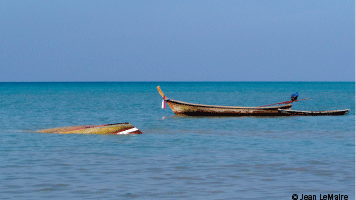
Alumni and faculty write about living through the disaster.
The earthquake and tsunami that struck Southeast Asia on December 26 killed a quarter-million people, injured many more, and caused untold property damage. No members of the Penn community perished in the disaster, but alumni, faculty, and students in the region have lived through a terrifying time, fearing for their own lives and those of friends and loved ones, and sometimes losing people close to them.
In January we wrote to about 500 alumni for whom the University has e-mail addresses, asking them to share their experiences of the disaster.
Our thanks to those who wrote, and our profound sympathies to everyone in the affected countries. Some writers are seeking donations for tsunami relief, and information on how to help can also be found at the alumni website, www.alumni .upenn.edu. And please see “Alumni Profiles” for a related story on Richard Walden C’68 L’72, whose rapid-response relief organization, Operation USA, is working in the region.—J.P.
An Encounter with Grengjai
By Lauren Karp | Immediately after finishing her first meal in 20 hours, Wan vomited in the bushes and fainted in the dirt. One on each side, Wan’s husband and son carried her—her bottom dragging across the moonlit school yard—to the back of a pickup truck, and she was gone. Three hours later, bandaged and hobbling, she returned to us to make certain we were not alone in the midst of disaster. This is grengjai.
Grengjai doesn’t have an exact translation from Thai to English, but it is the Thai value that one must do everything possible to help another and simultaneously avoid becoming an imposition. It’s the platinum rule—do unto others better than you want them to do onto you—and it saved my life during the tsunami.
On December 26, I found myself on a boat to the Similan islands with my friend, who was visiting from America. I have been a teacher at Khon Kaen University, in the northeast region of Thailand, since a minute after returning my graduation robes last May. While my students were busy with exam week, I decided to don swimsuit and snorkel mask in paradise. One hour before the wave descended my friend and I met Wan, a guide, and boarded her speedboat, but when the islands were in view the boat stopped. Wan explained that there had been an underwater earthquake, and it had caused severe flooding so we would not be able to go to the islands. We floated on the sea for a long time. Periodically Wan wiped away a stray tear and squeezed the Buddha amulet on her neck. When she caught my eyes peeking into her distress, she quickly straightened her neck and flicked her salty tears back into the sea with a smile.
Seven hours later, she decided it was safe to go back to Phang Nga, but as our boat neared the shore she could no longer disguise her terror that her husband and son might be dead, and she cried with tented hands pressed to her forehead.
When we reached the remains of a pier, a heavy German man grabbed my wrist to pull me over the edge of the dock. We were on land again, and Wan herded all of her passengers to the road. After everyone had been packed into cars, vans, and trucks, we climbed into the bed of a pick-up with Wan and her friends. As we sped down the road, the moist wind stung my eyes, which glazed over at the sight of vertical cars and beached boats. She took us to a Wat, and despite our pleas that she leave to take care of her own family, she insisted on staying with us. We were foreigners and she knew we had no place to go and no one to take us there. She ushered us away from the crowds of wailing Thai families, and when trucks of dead bodies began to arrive, she moved us to a little school on a hill, where she saw her 10-year-old son and her husband.
In the midst of her reunion her face switched from joy to horror, and she told us to run upstairs. Flustered, I looked for my belongings, but Wan cornered me from behind and, like a mouse in a maze, I ran up the stairs. There were too many people on the upper balcony, and I feared I would drown in their panic before the water ever got there. My eyes sought my friend, but before they met his face someone below called, “Mai Nam, Mai Nam!” No water. We staggered back down the stairs, and for the first time that day I understood the pure terror of death, from which Wan had to that point protected me.
The night ached on, and I lay on the tile patio of the school trying to sleep, but the sounds were too loud. Thai women who had seen their babies washed away shrieked like the infants they had held hours before, and three Germans nearby moaned from the sharp pain of their bruises and grief over their missing fourth. My friend and I waited and took silent joy in our completeness, while wishing the rest could be absorbed into the night.
The next morning Wan permitted us to go, and we headed down the highway with outstretched thumbs. When we reached Bangkok we went directly to the hospital to donate blood. As red fluid leaked out of my arm, I told the nurse my story. In the Buddhist religion, she said, one would believe I had made much merit in my life. I’m not sure of her theory. Throughout the day, my friends and co-workers called and celebrated my good luck. Luck was a partial factor. Luck, fate, merit, destiny; I don’t know why I was safe when so many others perished. It is a truth that I am not yet able to consider, and, instead, my mind turns to Wan and how she protected my body and mind despite the disintegration of her world all around her. This is grengjai.
Lauren Karp C’04 is still an English teacher at Khon Kaen University and will return to the States this April. Her friend, Corey Brooks C’03, is currently a U.S. history graduate student at UC Berkeley, and he has safely returned to California.
Thailand Stands Very Tall
By Jean Lemaire | On Monday, December 27, I was having breakfast at the Bangkok Hyatt Erewan hotel, selecting delicious foods from a sumptuous buffet with freshly baked French chocolate croissants, made-to-order Belgian waffles, even a chocolate fountain. It was a surreal experience.
I realized that many of the people whose paths I had briefly crossed the day before were either dead or homeless, and that the only reason I had slept in a king-size bed in Bangkok’s finest hotel was the fact that I am an affluent Westerner. It did not feel good to be a Westerner that week. It also started to dawn on me how extraordinarily lucky I had been the day before.
I was in Thailand to teach a two-day intensive insurance seminar in Bangkok. The seminar was organized by Dr. Narumon Saardchom WG’02 GrW’03, a former doctoral student of our department and a former teaching assistant for my actuarial classes. Narumon and I hadn’t seen each other since she graduated, but we had remained in contact to finalize the publication of a joint paper. We were looking forward to our reunion, and I even managed to convince her to become a certified scuba diver and join me on Phuket Island to explore some of the world’s most beautiful coral reefs.
There are about 25 diving centers on Phuket Island. All but one are situated on Patong Beach. I selected that other one, on Nai Yang beach, in the hope that Narumon’s scuba discovery would be more enjoyable in a peaceful setting. (It wasn’t, but the choice was the first in a series of fortunate events that may have saved our lives.)
Luck #1: Patong Beach was leveled. Nai Yang suffered less damage, maybe due to a better orientation and a different beach slope.
Luck #2: The Swiss driver of the dive shop behaved in a very un-Swiss way that day, as he was 25 minutes late to pick us up at our hotel. And so, when the tidal wave hit, we were on the beach preparing our gear. Had he been on time, we would have been on the boat or diving in very shallow waters.
Luck #3: When I saw the waters receding from the beach, I did not know what it meant, despite having felt the earthquake early in the morning. The dive master, fortunately, was more knowledgeable than me, and yelled to get out as fast as we could. He gave us a two-minute advance notice that proved to be crucial. So we were about 200 yards away from the beach when the first wave hit and sunk our diving boat. And we were about half a mile inland when the second wave hit, and ran out of steam at our feet.
At that time a wonderful Thai employee of a nearby resort took us in her car, out of reach of the third wave, which did most of the damage. She offered us lunch at her home, and drove us back to the beach in the afternoon, where we were stunned to see what had occurred. Narumon’s rental car was totaled, but as a good insurance student she had purchased full coverage. Another wonderful Thai driver took us back to our hotel.
We were then driven to the airport, and Thai Airways sent all of their available planes to Phuket that evening. Narumon’s Thai fluency proved very useful in getting seats in the third plane out, leading to an unexpected night at the Bangkok Hyatt Erewan—only then did we learn about fatalities—and the sumptuous breakfast buffet.
I hope that many of the readers of The Pennsylvania Gazette will visit Thailand someday. Thailand stands very tall after this catastrophe. Disasters often bring the best out of people, but the numerous acts of kindness and solidarity displayed by Thais on December 26 cannot be understated. They saved thousands of people that day. And I hope Narumon will some day enjoy scuba diving. Her first experience did not turn out to be that great.
Jean LeMaire is a professor of insurance and actuarial science as well as the director of the actuarial-science program at Wharton.
It Will Take Years to Rebuild
By Sasibai Kimis | On the morning of the 26th, I felt my house shake for a few seconds. I ran to my sister’s room, but it seemed like no one else at home had felt it. I just dismissed it. Later in the evening, as we watched CNN and the BBC, we realized what had happened. We began calling our relatives in Tamil Nadu frantically to make sure they were all right. The devastation caused is unbelievable.
I was robbed on New Year’s Eve. I lost my money, phone, and credit cards. But all I could think of were all the people who had lost everything they had built all their lives, all their family members, all their hopes and dreams.
I am also a scuba diver, and when I heard that many divers were trapped off the waters of Thailand, I was very distressed. Some friends who had gone diving recounted their experience [of] hanging on with reef hooks and yet having the reef break off due to the strength of the currents. They all hung on to rocks below the sea at a depth of 25 meters. Thankfully, they all survived.
All of us around the world should assist in any way possible. [It] will take years [for people] to rebuild their homes, surroundings, and their hope for life.
Sasibai Kimis W’00, a native of Malaysia, is currently working in an unpaid internship with the United Nations Development Program in Ghana.
The Anger Also Sets In
By Sally Jutabha Michaels WG’90 and David Michaels W’84 | We returned to Thailand [after traveling abroad] and the reality has been terrible. The tsunami has brushed the families in Thailand without discrimination. Many are just receiving news even today that someone they know was killed and funerals are scheduled. Many are still missing, and memorials are postponed with the hope that the loved one is in a hospital somewhere, in someone’s care.
Our school of 2,000 students saw four terrible tragedies—a small mirror of the broader tragedy that has touched the world. A French family lost three young sons; a Brazilian/Italian family lost mother, father, and son, leaving one surviving daughter; a German teacher and her husband [were] both lost; and [in] a British Thai family, only the mother survived, two children died—the father and a son [are] still missing. With the start of school yesterday, the mourning, and the remembrances, have just begun, and with that the task of speaking to our children, whose teacher or whose friend will not ever come back.
The need for accountability is setting in. The head of the Meteorological Department was reassigned yesterday. A familiar man has been appointed to spearhead the country’s warning system—a man who had previously warned of the potential for tsunami tragedy. Years before he was not believed. The irony is that he didn’t want this type of tragedy to be his proof and tried to warn people even on the day—the Sunday of Boxing Day, people with Christmas and Saturday night hangovers, no one at work, no one answering the phone. The anger also sets in.
The other news in Thailand is that of the volunteers, the overworked helpers, and the drained and tireless pathologists. The Thai military has started the clean up, the building of temporary homes. Everyone is working overtime, and overworked.
The government is also at work. Spearheading relief efforts, working with aid agencies, coordinating with other governments, trying their best to assist and guide assistance. Money is being set aside for the provinces affected and for a regional warning system.
And the giving continues. Everyone wants to ensure the monies get directly to those that need it most, or the causes that most directly address those needs.
Sally Jutabha Michaels is adviser to the Thai Trade Representative, Dr. Kantathi Suphamongkhon, and David Michaels is managing director of GMS Power Public, Co. Ltd., a private power-development company. They have lived in Thailand for 14 years and have four children enrolled at the international Bangkok Patana School. The text above came from a letter they sent to family and friends on January 6.
In a Blink of an Eye
By DeeYinn Leong | My hometown was hit by the tsunami and the death toll in Penang was about 38, but many people lost their homes and their livelihoods. However, thank God, the waves were relatively small compared to other places. I traveled to Medan in Indonesia the day after the tsunami and visited the hospitals that were receiving the first victims from Acheh. Many were in a state of shock and were staring blankly. Most in the hospitals had been battered by debris and had horrible bruises on their faces and bodies. We gave them some hard cash because these people had lost everything, and basic clothing and food do not cover many personal needs. In a blink of an eye, they had no more family, or possessions. Not even shoes.
I found one of my students in Medan and she had been caught in the wave in Acheh and was nearly swept away, along with her mom. She survived by hanging on to a fence. Her family gathered in an aunt’s house and was without water and electricity for three days while the flood receded. They had to salvage whatever food floated by in packets (like instant noodles). After three days, they made their way through the mud amid rotting corpses, snakes, and monitor lizards to the outskirts of town where they hitched a ride to the airport (and had to pay enormous amounts for the ride).
Another student’s mother was killed in Phuket, when she opened her hotel room door and was immediately swept out by the wave. Her husband survived because he was pinned to the wall by a car. The children are safe as they were in China at that time. Now we’re trying to help them deal with the loss of their mom.
DeeYinn Leong GEd’98 is a teacher at the Uplands International School in Penang, Malaysia.
Every Child Has a Scar in Their Heart
By Shigeko Baba | About the present condition in Vadduwan village: 15 of the 125 students were sacrificed by the tsunami. On January 10, the new semester officially started. Two neighboring schools were destroyed, so this school gained 175 students. It is expecting to gain more.
Up until January 9, we at Surangani opened a clinic and coped with this situation. The main symptoms were fever, headaches, itches, nausea, bruises, and external injuries. Most children suffered stomach aches. Mothers who lost their children were absent-minded and suffered headaches and nausea.
Seven of [the students] lost their mothers. In addition, about 40 percent of the students lost brothers and/or sisters. A boy who was mourning his little sister with tears said that he let her hand go, so she was taken into the sea. One girl lost three younger brothers. Every child has a scar in their heart.
We made an activity space where they will be able to play games, paint, do crafts, and read books—a space that they can spend their time freely. Most of the children keep irregular hours. We made a snack time two times a day and give them milk and biscuits for good nutrition. We’re starting a garden, and children come to our place and weed, seed, and plant here.
The children need writing materials, shoes, and bags for school, so we decided to use some of the initial contributions for those things. On January 14 we will light many small oil lamps for people who passed away and for those who lost loved ones.
From a letter written January 11 by Shigeko Baba GEd’00. Baba runs a non-governmental organization in Sri Lanka, Surangani Volunteer Services, which is working to rebuild a preschool destroyed by the tsunami. For more information on how to make a donation, see its website, www.surangani.org, or contact her at [email protected].
Help and Kindness Can Still Be Found
By Patraporn Techapaibul | December 26 was just another lazy Sunday for me until my cell phone started ringing off the hook. It was one of my friends. A tsunami had hit the southern provinces of Thailand and no one was able to contact our group of friends who were scuba diving in the area.
It was not until Monday morning, when the news coverage started to broadcast scenes of the devastated areas, [that the severity of the situation] really hit me. My diver friends were fine, it turned out. But as a Thai and as a diver, I have a deep connection to the southern islands of Thailand. I had spent countless days and nights on those beaches.
Many people in my office took the day off to volunteer their services in the rescue effort. I volunteered at the Bangkok disaster center, where I helped foreign survivors make phone calls. It was an emotional roller coaster for me. I shared a caller’s happiness when a missing friend was located safe in a hospital and another’s total devastation when a loved one was found dead.
Help poured in from every direction, and even the smallest gesture meant a lot. As soon as the disaster center opened, busloads of volunteers arrived to help translate foreign languages, pack donations, or even serve food. I met a 12-year-old boy who volunteered at the disaster center as a German translator.
The tsunami disaster has shown that even in times of need, help and kindness can still be found in this country. And that truly warms my heart.
Patraporn Techapaibul EAS’02 works at DTAC, a mobile phone company in Thailand.
These Could Have Been Our Stories
By Shelley Bowman Harris | We live in a close-knit community around International School Bangkok, where our daughter is an eighth grader. After the tsunami hit, the school administration did a wonderful job of gathering and disseminating information about families that had been vacationing in the affected areas and had reported in to the school that they were safe. The list of “safe” families grew by the hour and day and we started to exhale, believing that our community had escaped unscathed. But it wasn’t to be.
We soon learned that one that one of the teachers at the school and his family had been vacationing at a beachfront hotel in Khao Lak. He and his wife and two members of her family visiting from the Netherlands had been seriously injured. But far worse, their seven-year-old twins were missing. None of us can imagine how/when/if they will ever recover emotionally from the loss of their little boy and little girl.
Everyone in this community knows that with slightly altered circumstances, these stories could have been our stories: A changed holiday plan, a different hotel, being on the beach instead of in the coffee shop, the earthquake happening six months or twelve months earlier. Of course, the school and the community are doing many of the same things that people around the world are doing to try to help with the relief effort. We are organizing fundraising events, collecting clothing and other needed supplies, and donating to relief organizations. But one additional thing that we can do is to go back to the beaches of southern Thailand. If tourism dies, it will be a devastating blow to the economy and to the countless Thais who earn their living working in the tourism industry. The beaches here are beautiful and peaceful. (Not to mention a great value for the money.) The hotels and restaurants and stores will repair and rebuild. I hope that before too long they will be filled with visitors enjoying a Thai holiday.
Shelley Bowman Harris W’83 and her husband, William Harris W’83 WG’98, have been living in Thailand for nearly six years. Bill is the CFO for True Corporation, a Bangkok-based telecommunications firm.




